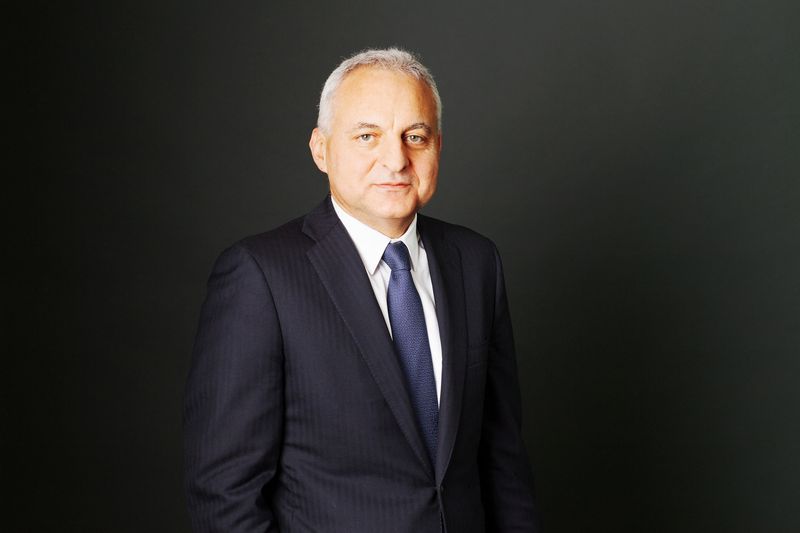By Paul Sandle, Sarah Young and Tim Hepher
LONDON (Reuters) -The chief executive of Rolls-Royce (LON:RR) said on Wednesday his mission to lift the British company's profits was compatible with continuing to gain market share and delivering improvements in engines demanded by airlines.
Tufan Erginbilgic was brought into Rolls-Royce last January to turn around Britain's flagship engineering company, and investors like what they have seen, with the shares rising more than 200% this year.
But his challenge is to convince airlines after a public row with Dubai's Emirates, one of the world's biggest, whose president told Rolls last month to "go back to basics" and pay attention to improving the durability of its products before raising prices.
"We are going to transform Rolls-Royce with customers, not against customers," Erginbilgic told Reuters.
Emirates has said the time between repairs of Rolls' XWB-97 engine in hot and dusty conditions must improve before it will buy A350-1000s, raising questions over the impact on plane maker Airbus for which Rolls is the sole supplier of engines for wide-body jets.
Long-standing customer Thai Airways is finalising an order for 80 Boeing (NYSE:BA) 787s powered by competitor GE after disagreements over pricing with Rolls, industry sources have told Reuters.
The move, which is intertwined with a defeat for the Airbus A350, follows a disagreement over whether Rolls could increase prices for engines on previously acquired 787s, in the event the airline added GE to its all-Rolls wide-body fleet, they said.
None of the parties have agreed to comment.
But Erginbilgic said in an interview on Wednesday that orders continued to flow despite recent criticisms.
"There is one deal, which is very important and big," he said. "We've made the deal. It is not announced yet."
Some analysts have voiced concerns about the impact of efforts to improve prices on Rolls' market share, even though the size of the market is growing overall. Competitivity is driven partly by the number of engines built relative to rivals.
Erginbilgic rejected this.
"Our delivery market share is around 55% and that will continue for the next 5-10 years, so we are gaining market share every year including this year".
GE's share has been curbed partly by Boeing delivery delays.
Based on underlying aircraft deliveries and excluding spares, Agency Partners analyst Nick Cunningham said Rolls had a 52% share of large engine deliveries in 2022, projected to dip to 48% in 2027 versus GE's 47% (with the rest represented by Pratt & Whitney engines for U.S. military tankers).
"They are around equal. If Boeing can ramp higher, then GE will overtake RR again, but that’s a big if," he said.
'TIME-ON-WING'
Durability is a key issue for airlines because unscheduled repair visits, coupled with higher waiting times for spares across the industry, have forced many planes to be grounded.
Christine Ourmieres-Widener, CEO of Air Caraibes and French Bee, said waiting times for spare A350 engines is 18-24 months.
Erginbilgic said Rolls is investing heavily in improvements to its Trent 1000 engine, an option on Boeing's 787, and the XWB-97, which exclusively powers the Airbus A350-1000.
"I'm investing in the next three or four years more than 1 billion pounds in time-on-wing," he said.
"We are more than doubling Trent 1000 time on wing, XWB-97 time on wing is actually good in benign environments; in non-benign environments we will more than quadruple."
Long-delayed certification of improvements to the Trent 1000 will come next year, he said, aiming to restore its competitiveness on the Boeing 787.
"We've done everything we could. It is going to be certified now next year," he said.
"That will more than double durability. Then in 2025, given our programme, we will make another 25-30% improvement. Our engine will be very competitive to GE's engine."
Analysts say GE has effectively become the de facto sole engine of choice on the 787 in recent orders.
"We would like to grow Trent 1000 and grow our position in 787 as well," Erginbilgic added.
The historic Trent 1000 durability problems have dragged on Rolls since 2016, and the company only narrowly avoided collapse during the COVID-19 pandemic, as a turnaround attempt floundered.
Erginbilgic's fix for the Derby, England-based company, which also has defence and nuclear capabilities, is a new pricing strategy for the sale and maintenance of its engines, while at the same time boosting durability for airlines and curbing costs for Rolls.

Erginbilgic insisted Rolls had come a long way since he was famously reported to describe the company he had just joined in January as a "burning platform".
"It is not the same company," he said.